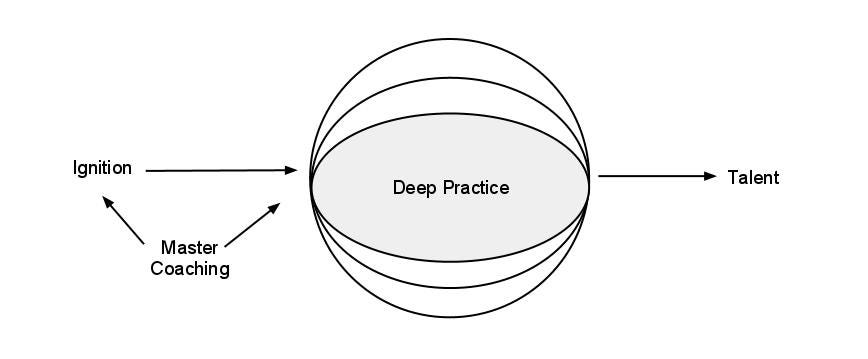
After a couple of months wandering, I am back to track to finish all the book readings recommended by “Acton Academy”.
I finished “The Talent Code: Greatness isn’t born. It’s grown. Here’s how.” yesterday when I was waiting for my dad’s heart stent surgery. The book constantly discuss that talent is nature or nurture.

There are three parts of talent creation. The ignition of wanting to be better and continue improving. The deep practice needed to increase and create myelin. The coaching needed to guide the whole journey and make it happen.
The book started by explaining what is talent and introduced Myelin. Myelin is a fat like substance that wrap around the never needed to perform a certain task. Any thing we do is to send an electric pulse through the nerve. As the pulse travels, it loses strength. Myelin is there to insulate and preserve the strength, leading to repeatable and high accurate performance that we called talent, but not luck.
The revolution is built on three simple facts. (1) Every human movement, thought, or feeling is a precisely timed electric signal traveling through a chain of neurons – a circuit of nerve fibers. (2) Myelin is the insulation that wraps these nerve fibers and increases signal strength, speed, and accuracy. (3) The more we fire a particular circuit, the more myelin optimizes that circuit, and the stronger, faster, and more fluent our movements and thoughts become.
The author shared the concept of Deep Practice and focused on its the reason to increase myelin. Deep practice is built on a paradox: struggling in certain targeted ways – operating at the edges of your ability, where you make mistakes – makes you smarter. Or to put it a slightly different way, experiences where you’re forced to slow down, make errors, and correct them – as you would if you were walking up an ice-covered hill, slipping and stumbling as you go – end up making you swift and graceful without your realizing it.
The trick is to choose a goal just beyond your present abilities; to target the struggle.
Every expert in every field is the result of around ten thousand hours of committed practice. It does not need to be 10-12 hours a day. A lot of talent practice only 3-5 hours a day. This means 10 years practicing.
Holy Shit Effect – HSE is when we see some talent happens from day to day people just like us. How to make it happen? Three rules.
Rule 1 – Chunk it up. First, look at the task as a whole – as one big chunk, the mega-circuit. Second, divide it into its smallest possible chunks. Third, play with time, slowing the action down, then speeding it up, to learn its inner architecture. Absorbing a picture of the skill until you can imagine yourself doing it. Quite like visualization. Break it to chunks. Slow it down so that you can attend more closely to errors, creating a higher degree of precision with each firing. (A great example here of chess player)
Rule 2 – Repeat it. Firing the impulse down the nerve fiber, fixing errors, honing the circuit.
Rule 3 – Learn to feel it.
The second part of the book talks about ignition. Why people want to go into deep practice, while some other don’t. While deep practice is all about staggering-baby steps, ignition is about the set of signals and subconscious forces that create our identity; the moments that lead us to say that is who I want to be.
The answer is FUTURE BELONGING. Each signal is the motivational equivalent of a flashing read light: those people over there are doing something terrifically worthwhile. They look like me, why can’t I do it?! We have all felt motivated by the desire to connect ourselves to high-achieving groups. Those are the primal cues.
Talent requires deep practice. Deep practice requires vast amount of energy. Primal cues trigger huge outpourings of energy. Safety and future belongings are two powerful primal cues.
The third and last part of the book talks about master coaching. Master coaching is something more evanescent: more art than science. Master coaches are the human delivery system for the signals that fuel and direct the growth of a given skills circuit, telling it with great clarity to fire here and not here.
Three virtues are needed. 1) The matrix. 2) Perceptiveness. 3) The GPS Reflex.
The framework the book layout is simple yet ground breaking. It gives me a way to seek what Phoebe, Hanalei, and Chelsie may be interested in. It also gives me an expectation to know that the journey of them pursuing what they like won’t be easy. I need to create a safety net for them to fail to learn and to grow.

